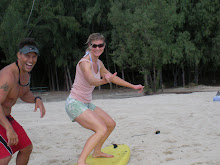Even though it's winter, there's still plenty you can do as a family to stay active.
I want to be a positive role model for my kids. I also want to be around to enjoy my grandchildren someday. And by enjoy I mean I want to actively play with them. Those are two of my top reasons to stay fit.
As a mom, sometimes it's really hard to work in a workout. But if you do family activities that include exercise you can multitask in many ways:
* as a role model,
* by building strong bonds with your kids,
* by getting your exercise in
* by actively helping your family stay fit.
One great Web site is from our Canadian neighbors in Alberta. It has 101 ideas for keeping your family active.
For more, see: http://www.healthyalberta.com/ActiveLiving/173.htm
You can also check out an article I wrote for The Olympian newspaper at: http://www.theolympian.com/living/story/737984.html
Unfortunately, childhood obesity is a real concern for everyone.
Recently I spoke with Dr. Carl Lindgren of Healthy Future Pediatrics in Olympia, WA.
During his 19 years of practice, Dr. Lindgren has seen the rise in childhood obesity firsthand. And it’s coming on at younger and younger ages, according to the Centers for Disease Control.
The prevalence of obesity increased almost tripled for all ages of kids between 1980 and 2006, according to the CDC.
Ages 2-5: To 12.4 percent, up from 5 percent
Ages 6–11: 17 percent, up from 6.5 percent
Ages 12–19: 17.6 percent, up from 5 percent.
That’s worrisome because obese children and adolescents are more likely to have risk factors associated with cardiovascular disease (such as high blood pressure, high cholesterol, and Type 2 diabetes), asthma and sleep apnea. They also face social discrimination and are more likely to become obese as adults.
Kids don’t need to be classified as obese, either, for concerns to arise. Lindgren often sees patients’ body mass indexes – ratio of height to weight – trending the wrong way at a checkups.
It’s a touchy subject, but reversing the trend in the early stages can make all the difference in a child’s health and well being, he says.
Want to check whether your child has a healthy body mass - or whether you do? The CDC offers a BMI calculator for children and teens. There’s also a link for tips on measuring a healthy weight at accurately at home. There are many factors to consider – the BMI is a screening tool but does not measure actual body fat -- so if you have concerns contact your doctor. The site is http://apps.nccd.cdc.gov/dnpabmi/Calculator.aspx
Sunday, January 25, 2009
Keeping your self, kids, family active
Labels:
101 activities,
cdc,
discrimination,
doctor,
exercise,
family,
family activity,
fitness,
fun,
kids,
mom,
obesity,
role model,
trend
Subscribe to:
Post Comments (Atom)




No comments:
Post a Comment